Commenting on the draft Law on Digital Transformation, the majority of opinions of National Assembly deputies in Group 16 (including National Assembly delegations of provinces and cities: Da Nang, Cao Bang, Tuyen Quang) expressed their high agreement with the necessity of promulgating the Law to institutionalize the policies and guidelines of the Party and State to promote digital economic growth, considering private enterprises as the core such as Resolution 57-NQ/TW of the Politburo on science and technology development, innovation and national digital transformation, Resolution No. 68-NQ/TW of the Politburo on private economic development...
Opinions affirmed that the promulgation of the Law on Digital Transformation at this time is very necessary to perfect the legal system on national digital transformation, creating conditions to promote comprehensive digital transformation, this is also an important legal basis for Vietnam to strengthen international cooperation and integration.
Regarding the scope of regulation in Article 1 of the draft Law, delegate Be Minh Duc - National Assembly Delegation of Cao Bang province affirmed that this is a new Law and has a fairly wide scope of regulation, directly related to many laws and draft laws that the National Assembly has issued or is revising at the 10th Session such as the Law on Industry, Digital Technology or the Law on Data, Law on Electronic Transactions, Law on Identification, Law on E-Commerce, Law on High Technology...
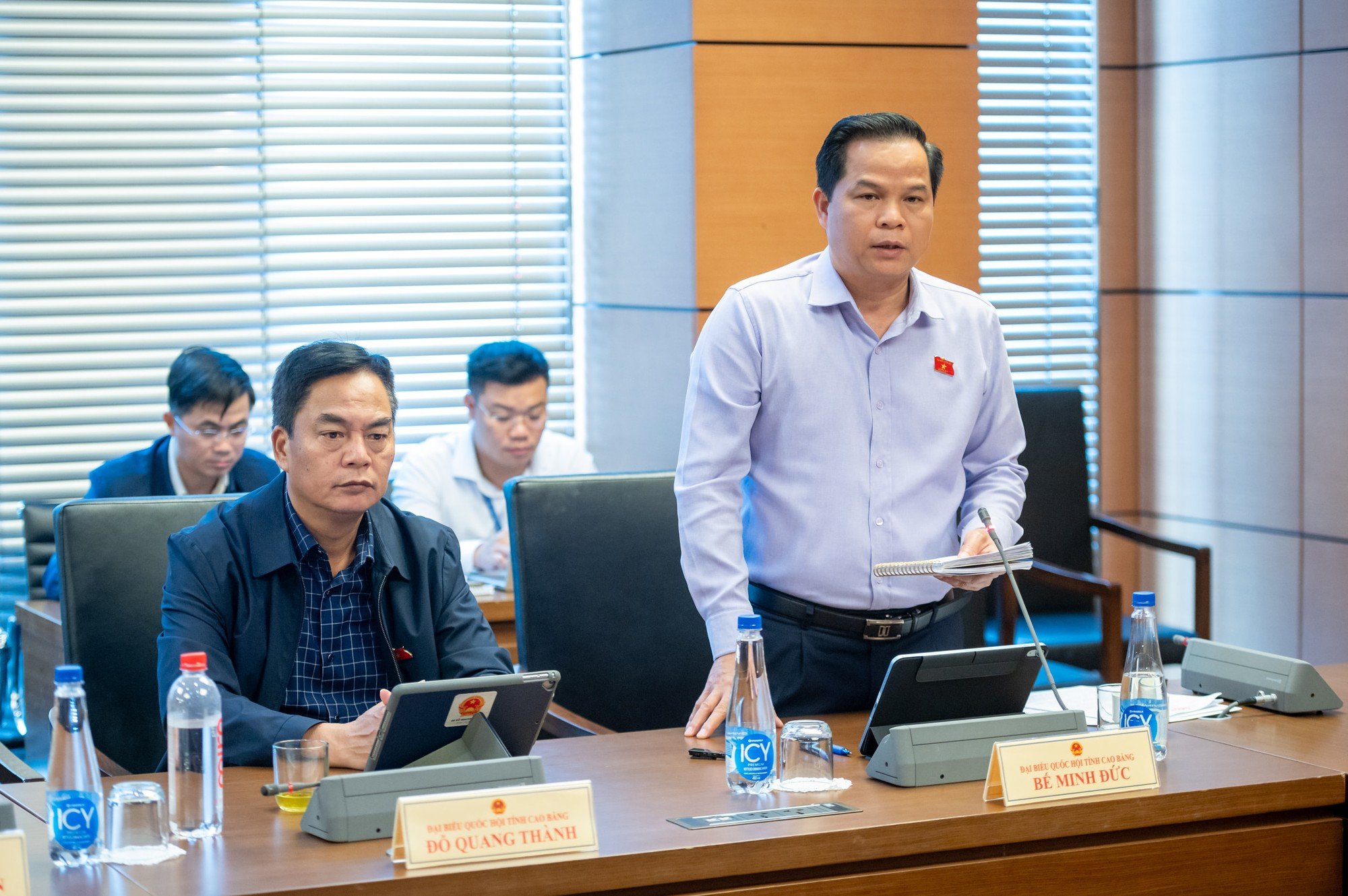
Delegate Be Minh Duc - National Assembly Delegation of Cao Bang province spoke.
Therefore, to ensure the consistency and uniformity of the legal system and the feasibility of the draft Law after its promulgation, delegate Be Minh Duc requested the Drafting Agency to carefully review and determine the position and role of the Law on Digital Transformation in the legal system to prescribe the appropriate scope of regulation, ensuring no overlap or duplication with other laws.
Regarding digital transformation activities in Article 6, delegates said that the current provisions of the draft Law do not fully cover the subjects participating in digital transformation activities, which are currently limited to the scope of digital transformation of state management agencies, and do not fully reflect the digital transformation activities of people and businesses such as activities of innovating production and business models based on technology and data of businesses or people.
Therefore, delegate Be Minh Duc suggested that the drafting agency should study and supplement digital transformation activities so that Article 6 fully reflects the three pillars that the draft Law currently identifies as digital government, digital economy and digital society. Accordingly, digital transformation activities can be regulated by subject groups, including: Activities of state agencies, activities of organizations, enterprises and activities of people.
Regarding the State's policy on digital transformation (Article 4), delegate Vuong Thi Huong - National Assembly Delegation of Tuyen Quang province highly appreciated the Drafting Committee for building Article 4 with comprehensive content, covering the pillars of national digital transformation, from infrastructure, data, human resources to network security and international cooperation.

Delegate Vuong Thi Huong - National Assembly Delegation of Tuyen Quang province spoke.
However, delegates said that the State's policy on digital transformation needs to be further specified, especially priority mechanisms for areas with particularly difficult socio-economic conditions, to ensure the principle of "no one is left behind" in the national digital transformation process.
Therefore, delegate Vuong Thi Huong proposed to add a separate clause to Article 4 on priority policies for disadvantaged areas. Specifically, add a policy for the State to prioritize budget allocation and mobilize social resources to invest in digital infrastructure, shared platforms and digital human resource training in mountainous, border, island and areas with particularly difficult socio-economic conditions.
At the same time, supplement policies to encourage businesses to participate in digital transformation through preferential mechanisms on tax, credit or interest rate support for digital infrastructure investment projects, development of online public services and training of community digital skills in mountainous, border, island areas and areas with particularly difficult socio-economic conditions.
Along with that, delegates suggested that it is necessary to supplement the State's policy in ensuring equal access for all people to infrastructure and digital services, especially for poor households and vulnerable people; possibly through equipment support programs, internet access subsidies, and improving information security capacity for people.

Delegate Au Thi Mai - National Assembly Delegation of Tuyen Quang province spoke.
Agreeing with the above opinions, delegate Au Thi Mai - National Assembly Delegation of Tuyen Quang province noticed that the State's policies on digital transformation are stipulated scatteredly in many articles of this Law, therefore, suggested that the Drafting Committee redesign them accordingly.
In addition, it is recommended that the draft Law should focus on priority policies on infrastructure development, land incentives, investment capital, and digital transformation human resource training for the State and business sectors, especially for disadvantaged areas, border areas, islands, and ethnic minority areas to effectively implement the two-level local government model; policies to support groups, educational institutions, academies, and schools to implement the "Digital Literacy for All" movement to help people grasp basic digital skills in daily life in order to truly bring Resolution No. 57-NQ/TW of the Politburo into life.
Regarding the principle of digital transformation in the political system and digital government, delegate Au Thi Mai suggested that the Drafting Agency amend and supplement the content of Article 13 of the draft Law to fully stipulate the principle of digital transformation of institutions in the political system, including digital transformation of the Communist Party of Vietnam, State agencies, the Vietnam Fatherland Front, socio-political organizations, social organizations, public service units, and other organizations.
Commenting on prohibited acts (Article 5), delegate Dang Thi Bao Trinh - National Assembly Delegation of Da Nang City said that the draft currently only stops at stating 5 prohibited acts but is still general, such as "infringing on the rights and legitimate interests of organizations and individuals in digital transformation activities" and does not cover specific violations of the digital space, especially related to artificial intelligence (AI), big data and automatic algorithms.
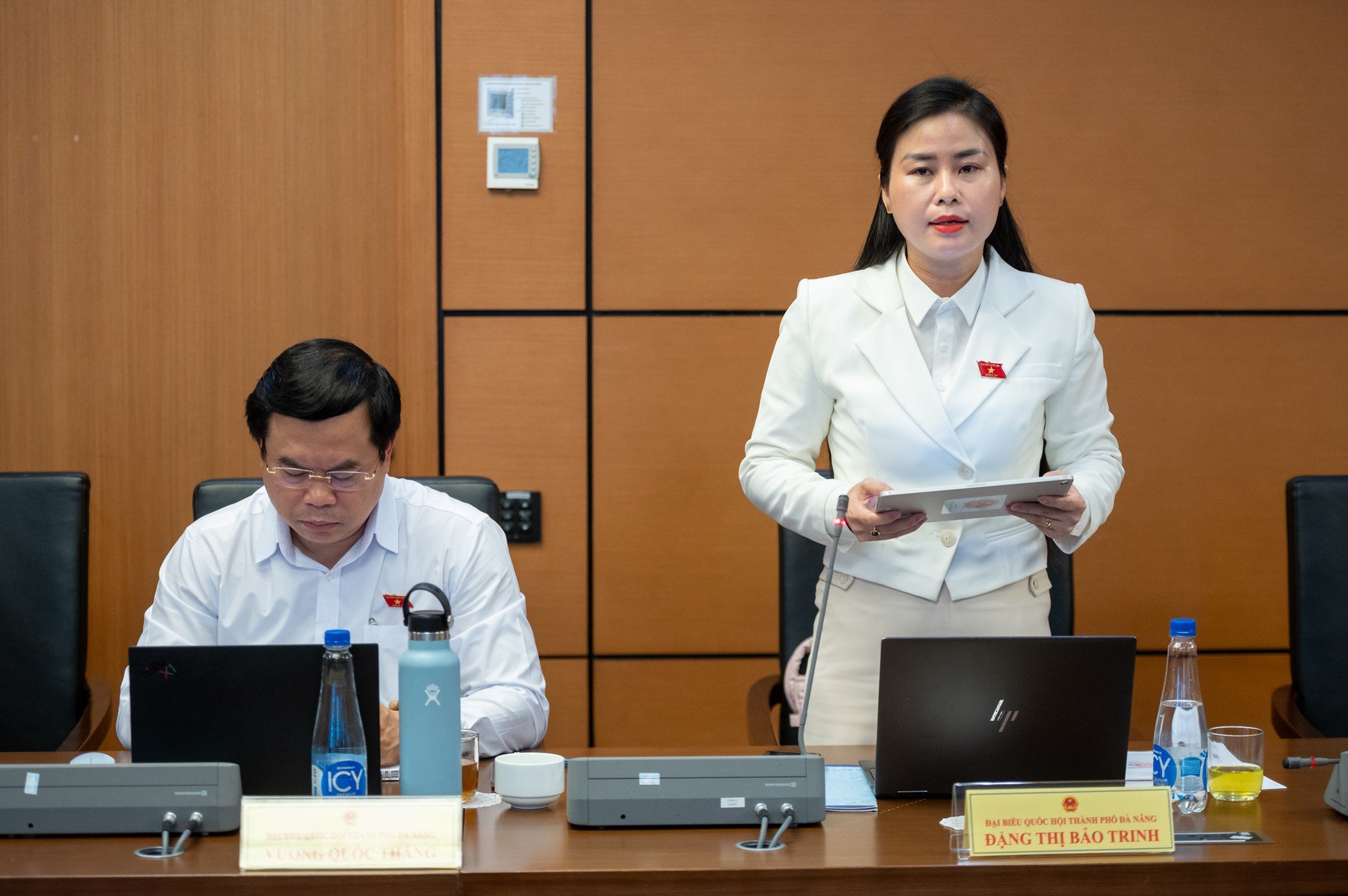
Delegate Dang Thi Bao Trinh - National Assembly Delegation of Da Nang City spoke.
From that reality, delegate Dang Thi Bao Trinh suggested that the Drafting Committee consider clearly adding the following groups of prohibited behaviors: (1) prohibiting the construction, deployment or use of algorithms and AI systems that have the ability or purpose to cause discrimination based on race, gender, religion, health status or other personal characteristics; (2) prohibiting the use of digital technology to incite, divide society, manipulate public opinion or discriminate against regions in cyberspace; (3) prohibiting the use of digital platforms to evade legal obligations, such as tax obligations, contracts, or financial reporting obligations; Unauthorized access, alteration, destruction or falsification of data leading to the omission of criminals, causing loss of digital economic security or hindering the investigation activities of state agencies.
Regarding digital transformation activities (Article 6), delegates said that Clause 1, Article 6 of the current draft Law mainly describes digital transformation activities in state agencies, not covering the roles of businesses, people and the social community, while these are two major forces that play a decisive role in the success of digital transformation.
Therefore, the Law needs to classify activities by subject groups, to clarify the responsibilities and support mechanisms of the groups: State agencies performing internal administration functions, providing online public services, opening public data; Group of enterprises implementing data applications, automating production, electronic transactions, digital commerce; and Group of citizens with the role of developing digital skills, using safe digital services, raising awareness and digital culture.
Therefore, delegate Dang Thi Bao Trinh suggested that the Drafting Committee consider expanding the scope of Article 6, and at the same time add the principle of encouraging the entire population to participate in digital transformation, through digital skills training policies, support for small and medium enterprises, cooperatives, and business households.
Source: https://bvhttdl.gov.vn/can-nhac-mo-rong-pham-vi-khuyen-khich-toan-dan-tham-gia-chuyen-doi-so-20251112093958733.htm



![[Photo] Prime Minister Pham Minh Chinh attends a conference to review one year of deploying forces to participate in protecting security and order at the grassroots level.](https://vphoto.vietnam.vn/thumb/1200x675/vietnam/resource/IMAGE/2025/11/12/1762957553775_dsc-2379-jpg.webp)
![[Photo] Highways passing through Dong Nai](https://vphoto.vietnam.vn/thumb/1200x675/vietnam/resource/IMAGE/2025/11/12/1762940149627_ndo_br_1-resize-5756-jpg.webp)





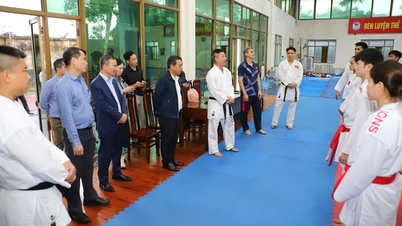





































































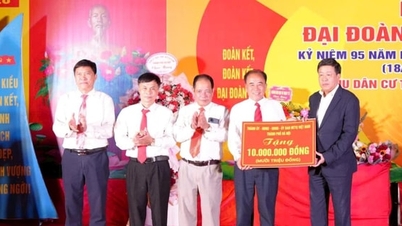

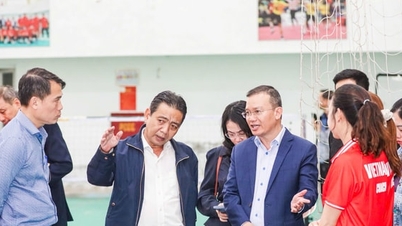






![Dong Nai OCOP transition: [Article 3] Linking tourism with OCOP product consumption](https://vphoto.vietnam.vn/thumb/402x226/vietnam/resource/IMAGE/2025/11/10/1762739199309_1324-2740-7_n-162543_981.jpeg)







Comment (0)